ion
-
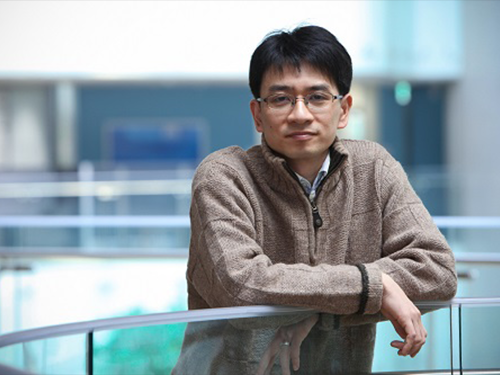 Professor Lee's Research Selected as Top 100 National R&D Projects
A research project, led by Research Professor Ju Yong Lee from the KAIST Institute for IT Convergence, was selected as one of the Top 100 National Research and Development Projects 2017.
This research project, titled LTE-A-based Single RF Small Base Station supporting Multiple Streams, developed 300Mbps low power, low complexity and broadband small base station technology that supports 4x4 MIMO (Multiple Input and Multiple Output) by proposing a new antenna structure and a new RF (Radio Frequency) structure based on LTE-A. Professors from the School of Electrical Engineering at KAIST, Dong Ho Cho, Songcheol Hong, and Yong Hoon Lee also collaborated on the project.
The existing heterodyne method of communication systems generates the problems of increasing unit price and system complexity.
In this project, however, Professor Lee directly modulated the baseband signal from the RF stage through an impedance loading-based RF chip. This method was designed to facilitate low power as well as low complexity while supporting broadband service. Based on this, his team developed source technology for RF that can be applied to fourth and even fifth generation networks.
Furthermore, this base station is smallest among the small-cell stations so far, providing an eco-friendly installation environment. It contributes to the market for fifth generation mobile communications by reducing power consumption significantly yet providing high-capacity services.
Professor Lee said, “This technology will contribute to creating a new market and additional jobs because business based on the fifth mobile generation can provide multi-functional services, including multiband. Requiring low power and providing high-capacity services anywhere at any time will enhance national competence and reduce costs for establishing a next generation mobile communication system. It is expected that this technology will help with disseminating mobile communication infrastructure through expanding information and communication system as well as the infrastructure of island areas.”
2017.11.08 View 10355
Professor Lee's Research Selected as Top 100 National R&D Projects
A research project, led by Research Professor Ju Yong Lee from the KAIST Institute for IT Convergence, was selected as one of the Top 100 National Research and Development Projects 2017.
This research project, titled LTE-A-based Single RF Small Base Station supporting Multiple Streams, developed 300Mbps low power, low complexity and broadband small base station technology that supports 4x4 MIMO (Multiple Input and Multiple Output) by proposing a new antenna structure and a new RF (Radio Frequency) structure based on LTE-A. Professors from the School of Electrical Engineering at KAIST, Dong Ho Cho, Songcheol Hong, and Yong Hoon Lee also collaborated on the project.
The existing heterodyne method of communication systems generates the problems of increasing unit price and system complexity.
In this project, however, Professor Lee directly modulated the baseband signal from the RF stage through an impedance loading-based RF chip. This method was designed to facilitate low power as well as low complexity while supporting broadband service. Based on this, his team developed source technology for RF that can be applied to fourth and even fifth generation networks.
Furthermore, this base station is smallest among the small-cell stations so far, providing an eco-friendly installation environment. It contributes to the market for fifth generation mobile communications by reducing power consumption significantly yet providing high-capacity services.
Professor Lee said, “This technology will contribute to creating a new market and additional jobs because business based on the fifth mobile generation can provide multi-functional services, including multiband. Requiring low power and providing high-capacity services anywhere at any time will enhance national competence and reduce costs for establishing a next generation mobile communication system. It is expected that this technology will help with disseminating mobile communication infrastructure through expanding information and communication system as well as the infrastructure of island areas.”
2017.11.08 View 10355 -
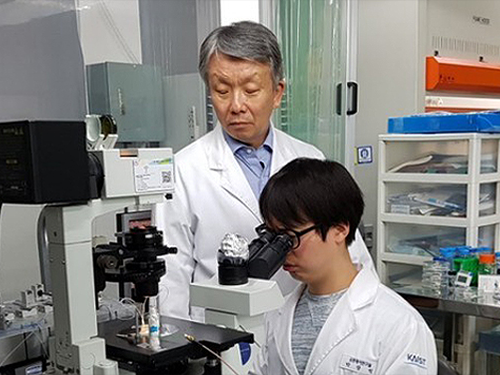 Scientist of November, Professor Hyung Jin Sung
Professor Hyung Jin Sung from the Department of Mechanical Engineering at KAIST received a ‘Science and Technology Award of the Month’ given by the Ministry of ICT and Science and the National Research Foundation of Korea for November 2017. He developed technology that can exquisitely control a micrometer-scaled liquid drop on a dime-sized lab-on-a-chip. With his work, he was recognized for reinforcing research capability on microfluidics.
Lab-on-a-chip is an emerging experiment and diagnostic technology in the form of a bio-microchip that facilitates complex and various experiments with only a minimal sample size required. This technology draws a lot of attention not only from medical and pharmaceutical areas, but also the health and environmental field. The biggest problem was that technology for the temperature control of a fluid sample, which is one of the core technologies in microfluidics, has low accuracy. This limit had to be overcome in order to use the lab-on-a-chip more widely.
Professor Sung developed an acoustic and thermal method which controls the temperature of a droplet quickly and meticulously by using sound and energy. This is a thermal method that uses heat generated during the absorption of an acoustic wave into viscoelastic substances. It facilitates a rapid heating rate and spatial-temporal temperature control, allowing heating in desired areas. In addition, Professor Sung applied his technology to polymerase chain reactions, which are used to amplify DNA.
Through this experiment, he successfully shortened the reaction time from 1-2 hours to only three minutes, making this a groundbreaking achievement.
Professor Sung said, “My research is significant for enhancing the applicability of microfluidics. I expect that it will lead to technological innovations in healthcare fields including biochemistry, medical checkups, and new medicine development.”
2017.11.03 View 11477
Scientist of November, Professor Hyung Jin Sung
Professor Hyung Jin Sung from the Department of Mechanical Engineering at KAIST received a ‘Science and Technology Award of the Month’ given by the Ministry of ICT and Science and the National Research Foundation of Korea for November 2017. He developed technology that can exquisitely control a micrometer-scaled liquid drop on a dime-sized lab-on-a-chip. With his work, he was recognized for reinforcing research capability on microfluidics.
Lab-on-a-chip is an emerging experiment and diagnostic technology in the form of a bio-microchip that facilitates complex and various experiments with only a minimal sample size required. This technology draws a lot of attention not only from medical and pharmaceutical areas, but also the health and environmental field. The biggest problem was that technology for the temperature control of a fluid sample, which is one of the core technologies in microfluidics, has low accuracy. This limit had to be overcome in order to use the lab-on-a-chip more widely.
Professor Sung developed an acoustic and thermal method which controls the temperature of a droplet quickly and meticulously by using sound and energy. This is a thermal method that uses heat generated during the absorption of an acoustic wave into viscoelastic substances. It facilitates a rapid heating rate and spatial-temporal temperature control, allowing heating in desired areas. In addition, Professor Sung applied his technology to polymerase chain reactions, which are used to amplify DNA.
Through this experiment, he successfully shortened the reaction time from 1-2 hours to only three minutes, making this a groundbreaking achievement.
Professor Sung said, “My research is significant for enhancing the applicability of microfluidics. I expect that it will lead to technological innovations in healthcare fields including biochemistry, medical checkups, and new medicine development.”
2017.11.03 View 11477 -
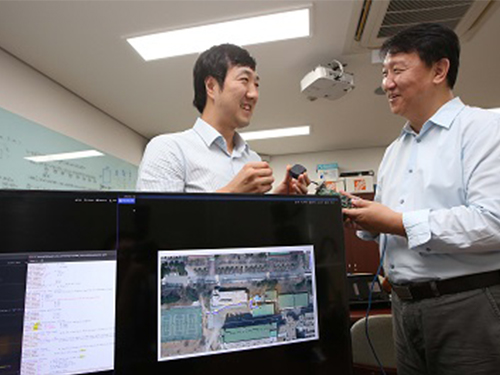 Highly Sensitive and Fast Indoor GNSS Signal Acquisition Technology
(Professor Seung-Hyun Kong (right) and Research Fellow Tae-Sun Kim)
A research team led by Professor Seung-Hyun Kong at the Cho Chun Shik Graduate School of Green Transportation, KAIST, developed high-speed, high-sensitivity Global Navigation Satellite System (GNSS) signal acquisition (search and detection) technology that can produce GNSS positioning fixes indoors.
Using the team’s new technology, GNSS signals will be sufficient to identify locations anywhere in the world, both indoors and outdoors. This new research finding was published in the international journal IEEE Signal Processing Magazine (IEEE SPM) this September.
Global Positioning System (GPS) developed by the U.S. Department of Defense in the 1990s is the most widely-used satellite-based navigation system, and GNSS is a terminology to indicate conventional satellite based navigation systems, such as GPS and Russian GLONASS, as well as new satellite-based navigation systems under development, such as European GALILEO, Chinese COMPASS, and other regional satellite-based navigation systems.
In general, GNSS signals are transmitted all over the globe from 20,000 km above the Earth and thus a GNSS signal received by a small antennae in an outdoor environment has weak signal power. In addition, GNSS signals penetrating building walls become extremely weak so the signal can be less than 1/1000th of the signal power received outside.
Using conventional acquisition techniques including the frequency-domain correlation technique to acquire an extremely weak GNSS signal causes the computational cost to increase by over a million times and the processing time for acquisition also increases tremendously. Because of this, indoor measurement techniques using GNSS signals were considered practically impossible for the last 20 years.
To resolve such limitations, the research team developed a Synthesized Doppler-frequency Hypothesis Testing (SDHT) technique to dramatically reduce the acquisition time and computational load for extremely weak GNSS signals indoors.
In general, GNSS signal acquisition is a search process in which the instantaneous accurate code phase and Doppler frequency of the incoming GNSS signal are identified. However, the number of Doppler frequency hypotheses grows proportionally to the coherent correlation time that should be necessarily increased to detect weak signals. In practice, the coherent correlation time should be more than 1000 times longer for extremely weak GNSS signals so the number of Doppler frequency hypotheses is greater than 20,000. On the other hand, the SDHT algorithm indirectly tests the Doppler frequency hypothesis utilizing the coherent correlation results of neighboring hypotheses.
Therefore, using SDHT, only around 20 hypotheses are tested using conventional correlation techniques and the remaining 19,980 hypotheses are calculated with simple mathematical operations. As a result, SDHT achieves a huge computational cost reduction (by about 1000 times) and is 800 times faster for signal acquisition compared to conventional techniques. This means only about 15 seconds is required to detect extremely weak GNSS signals in buildings using a personal computer.
The team predicts further studies for strengthening SDHT technology and developing positioning systems robust enough to multipath in indoor environments will allow indoor GNSS measurements within several seconds inside most buildings using GNSS alone.
Professor Kong said, “This development made us the leader in indoor GNSS positioning technology in the world.” He continued, “We hope to commercialize indoor GNSS systems to create a new market.” The research team is currently registering a patent in Korea and applying for patents overseas, as well as planning to commercialize the technology with the help of the Institute for Startup KAIST.
(Figure1. Positioning Results for the GPS Indoor Positioning System using SDHT Technology)
2017.11.02 View 7607
Highly Sensitive and Fast Indoor GNSS Signal Acquisition Technology
(Professor Seung-Hyun Kong (right) and Research Fellow Tae-Sun Kim)
A research team led by Professor Seung-Hyun Kong at the Cho Chun Shik Graduate School of Green Transportation, KAIST, developed high-speed, high-sensitivity Global Navigation Satellite System (GNSS) signal acquisition (search and detection) technology that can produce GNSS positioning fixes indoors.
Using the team’s new technology, GNSS signals will be sufficient to identify locations anywhere in the world, both indoors and outdoors. This new research finding was published in the international journal IEEE Signal Processing Magazine (IEEE SPM) this September.
Global Positioning System (GPS) developed by the U.S. Department of Defense in the 1990s is the most widely-used satellite-based navigation system, and GNSS is a terminology to indicate conventional satellite based navigation systems, such as GPS and Russian GLONASS, as well as new satellite-based navigation systems under development, such as European GALILEO, Chinese COMPASS, and other regional satellite-based navigation systems.
In general, GNSS signals are transmitted all over the globe from 20,000 km above the Earth and thus a GNSS signal received by a small antennae in an outdoor environment has weak signal power. In addition, GNSS signals penetrating building walls become extremely weak so the signal can be less than 1/1000th of the signal power received outside.
Using conventional acquisition techniques including the frequency-domain correlation technique to acquire an extremely weak GNSS signal causes the computational cost to increase by over a million times and the processing time for acquisition also increases tremendously. Because of this, indoor measurement techniques using GNSS signals were considered practically impossible for the last 20 years.
To resolve such limitations, the research team developed a Synthesized Doppler-frequency Hypothesis Testing (SDHT) technique to dramatically reduce the acquisition time and computational load for extremely weak GNSS signals indoors.
In general, GNSS signal acquisition is a search process in which the instantaneous accurate code phase and Doppler frequency of the incoming GNSS signal are identified. However, the number of Doppler frequency hypotheses grows proportionally to the coherent correlation time that should be necessarily increased to detect weak signals. In practice, the coherent correlation time should be more than 1000 times longer for extremely weak GNSS signals so the number of Doppler frequency hypotheses is greater than 20,000. On the other hand, the SDHT algorithm indirectly tests the Doppler frequency hypothesis utilizing the coherent correlation results of neighboring hypotheses.
Therefore, using SDHT, only around 20 hypotheses are tested using conventional correlation techniques and the remaining 19,980 hypotheses are calculated with simple mathematical operations. As a result, SDHT achieves a huge computational cost reduction (by about 1000 times) and is 800 times faster for signal acquisition compared to conventional techniques. This means only about 15 seconds is required to detect extremely weak GNSS signals in buildings using a personal computer.
The team predicts further studies for strengthening SDHT technology and developing positioning systems robust enough to multipath in indoor environments will allow indoor GNSS measurements within several seconds inside most buildings using GNSS alone.
Professor Kong said, “This development made us the leader in indoor GNSS positioning technology in the world.” He continued, “We hope to commercialize indoor GNSS systems to create a new market.” The research team is currently registering a patent in Korea and applying for patents overseas, as well as planning to commercialize the technology with the help of the Institute for Startup KAIST.
(Figure1. Positioning Results for the GPS Indoor Positioning System using SDHT Technology)
2017.11.02 View 7607 -
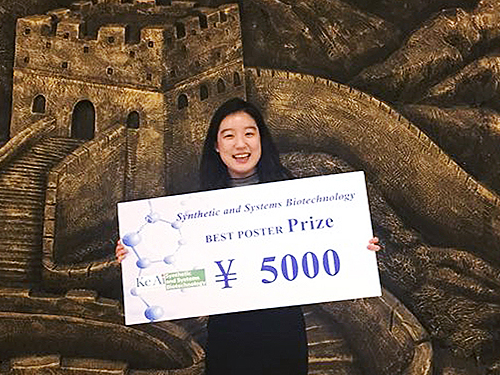 In Jin Cho Earned the Best Poster Prize at ME Summit 2017
In Jin Cho, a Ph.D. student in the Department of Chemical and Biomolecular Engineering at KAIST received the best poster prize at the International Metabolic Engineering Summit 2017 held on October 24 in Beijing, China.
The International Metabolic Engineering Summit is a global conference where scientists and corporate researchers in the field of metabolic engineering present their latest research outcomes and build networks.
At this year’s summit, about 500 researchers from around the world participated in active academic exchanges, including giving keynote speeches and presenting posters.
During the poster session, the summit selects one person for the KeAi-synthetic and Systems Biotechnology Poster Award, two for Microbial Cell Factories Poster Awards, and three for Biotechnology Journal Poster Awards among the posters presented by graduate students, post-doctoral fellows and researchers. Cho received the KeAi-synthetic and Systems Biotechnology Poster Award. Her winning poster is on the biotransformation of p-xylene to terephthalic acid using engineered Escherichia coli.
Terephthalic acid is generally produced by p-xylene oxidation; however, this process requires a high temperature and pressure as well as a toxic catalyst during the reaction process.
Cho and Ziwei Luo, a Ph.D. student at KAIST, co-conducted the research and developed a successful biological conversion process. Compared to the existing chemical process, it does not require a high temperature and pressure; and it is environmentally friendly with a relatively high conversion rate of approximately 97%.
Cho’s advisor, Distinguished Professor Sang Yup Lee said, “Further research on glucose-derived terephthalic acid will enable us to produce biomass-based eco-friendly terephthalic acid through engineered Escherichia coli.”
2017.10.31 View 11480
In Jin Cho Earned the Best Poster Prize at ME Summit 2017
In Jin Cho, a Ph.D. student in the Department of Chemical and Biomolecular Engineering at KAIST received the best poster prize at the International Metabolic Engineering Summit 2017 held on October 24 in Beijing, China.
The International Metabolic Engineering Summit is a global conference where scientists and corporate researchers in the field of metabolic engineering present their latest research outcomes and build networks.
At this year’s summit, about 500 researchers from around the world participated in active academic exchanges, including giving keynote speeches and presenting posters.
During the poster session, the summit selects one person for the KeAi-synthetic and Systems Biotechnology Poster Award, two for Microbial Cell Factories Poster Awards, and three for Biotechnology Journal Poster Awards among the posters presented by graduate students, post-doctoral fellows and researchers. Cho received the KeAi-synthetic and Systems Biotechnology Poster Award. Her winning poster is on the biotransformation of p-xylene to terephthalic acid using engineered Escherichia coli.
Terephthalic acid is generally produced by p-xylene oxidation; however, this process requires a high temperature and pressure as well as a toxic catalyst during the reaction process.
Cho and Ziwei Luo, a Ph.D. student at KAIST, co-conducted the research and developed a successful biological conversion process. Compared to the existing chemical process, it does not require a high temperature and pressure; and it is environmentally friendly with a relatively high conversion rate of approximately 97%.
Cho’s advisor, Distinguished Professor Sang Yup Lee said, “Further research on glucose-derived terephthalic acid will enable us to produce biomass-based eco-friendly terephthalic acid through engineered Escherichia coli.”
2017.10.31 View 11480 -
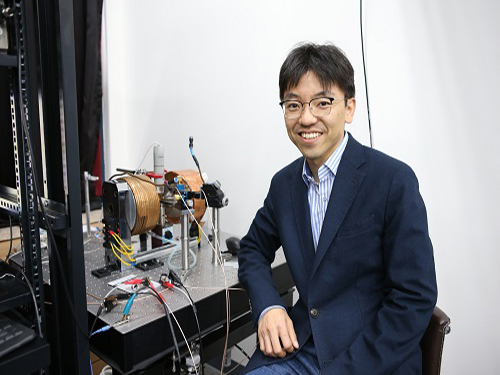 High-Speed Motion Core Technology for Magnetic Memory
(Professor Kab-Jin Kim of the Department of Physics)
A joint research team led by Professor Kab-Jin Kim of the Department of Physics, KAIST and Professor Kyung-Jin Lee at Korea University developed technology to dramatically enhance the speed of next generation domain wall-based magnetic memory. This research was published online in Nature Materials on September 25.
Currently-used memory materials, D-RAM and S-RAM, are fast but volatile, leading to memory loss when the power is switched off. Flash memory is non-volatile but slow, while hard disk drives (HDD) have greater storage but are high in energy usage and weak in physical shock tolerance.
To overcome the limitations of existing memory materials, ‘domain wall-based, magnetic memory’ is being researched. The core mechanism of domain wall magnetic memory is the movement of a domain wall by the current. Non-volatility is secured by using magnetic nanowires and the lack of mechanical rotation reduced power usage. This is a new form of high density, low power next-generation memory.
However, previous studies showed the speed limit of domain wall memory to be hundreds m/s at maximum due to the ‘Walker breakdown phenomenon’, which refers to velocity breakdown from the angular precession of a domain wall. Therefore, there was a need to develop core technology to remove the Walker breakdown phenomenon and increase the speed for the commercialization of domain wall memory.
Most domain wall memory studies used ferromagnetic bodies, which cannot overcome the Walker breakdown phenomenon. The team discovered that the use of ‘ferrimagnetic‘ GdFeCo at certain conditions could overcome the Walker breakdown phenomenon and using this mechanism they could increase domain wall speed to over 2Km/s at room temperature.
Domain wall memory is high-density, low-power, and non-volatile memory. The memory could be the leading next-generation memory with the addition of the high speed property discovered in this research.
Professor Kim said, “This research is significant in discovering a new physical phenomenon at the point at which the angular momentum of a ferrimagnetic body is 0 and it is expected to advance the implementation of next-generation memory in the future.”
This research was funded by the National Research Foundation of Korea (NRF) grant funded by the Korea Government (MSIP) (No. 2017R1C1B2009686, NRF-2016R1A5A1008184) and by the DGIST R&D Program of the Ministry of Science, ICT and Future Planning (17-BT-02).
(Figure 1. Concept Map of Domain Wall Memory Material using Ferrimagnetic Body)
(Figure 2. Scheme and Experimental Results of Domain Wall Speed Measurements)
2017.10.30 View 9470
High-Speed Motion Core Technology for Magnetic Memory
(Professor Kab-Jin Kim of the Department of Physics)
A joint research team led by Professor Kab-Jin Kim of the Department of Physics, KAIST and Professor Kyung-Jin Lee at Korea University developed technology to dramatically enhance the speed of next generation domain wall-based magnetic memory. This research was published online in Nature Materials on September 25.
Currently-used memory materials, D-RAM and S-RAM, are fast but volatile, leading to memory loss when the power is switched off. Flash memory is non-volatile but slow, while hard disk drives (HDD) have greater storage but are high in energy usage and weak in physical shock tolerance.
To overcome the limitations of existing memory materials, ‘domain wall-based, magnetic memory’ is being researched. The core mechanism of domain wall magnetic memory is the movement of a domain wall by the current. Non-volatility is secured by using magnetic nanowires and the lack of mechanical rotation reduced power usage. This is a new form of high density, low power next-generation memory.
However, previous studies showed the speed limit of domain wall memory to be hundreds m/s at maximum due to the ‘Walker breakdown phenomenon’, which refers to velocity breakdown from the angular precession of a domain wall. Therefore, there was a need to develop core technology to remove the Walker breakdown phenomenon and increase the speed for the commercialization of domain wall memory.
Most domain wall memory studies used ferromagnetic bodies, which cannot overcome the Walker breakdown phenomenon. The team discovered that the use of ‘ferrimagnetic‘ GdFeCo at certain conditions could overcome the Walker breakdown phenomenon and using this mechanism they could increase domain wall speed to over 2Km/s at room temperature.
Domain wall memory is high-density, low-power, and non-volatile memory. The memory could be the leading next-generation memory with the addition of the high speed property discovered in this research.
Professor Kim said, “This research is significant in discovering a new physical phenomenon at the point at which the angular momentum of a ferrimagnetic body is 0 and it is expected to advance the implementation of next-generation memory in the future.”
This research was funded by the National Research Foundation of Korea (NRF) grant funded by the Korea Government (MSIP) (No. 2017R1C1B2009686, NRF-2016R1A5A1008184) and by the DGIST R&D Program of the Ministry of Science, ICT and Future Planning (17-BT-02).
(Figure 1. Concept Map of Domain Wall Memory Material using Ferrimagnetic Body)
(Figure 2. Scheme and Experimental Results of Domain Wall Speed Measurements)
2017.10.30 View 9470 -
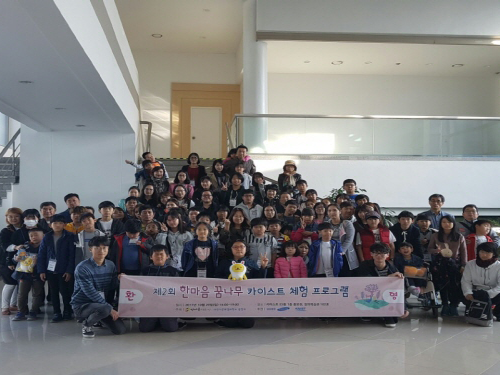 Hanmaeum Education Corps Invites Multicultural Families
About 100 graduates from the Multicultural Mother Schools and their families visited the KAIST campus on October 29 at the invitation of the Hanmaeum Education Corps of KAIST. The Hanmanum Education Corps is a volunteering organization composed of KAIST faculty and students. Many retired KAIST faculties are also members of the corps. Byong Kyu Choi, an Emeritus Professor from the Department of Industrial and Systems Engineering, is the director of the corps and has been leading the event since 2015.
With the support of a KAIST educational volunteering organization called SEED(Social Education Embracing Diversity), this year’s event offered various activities including a treasure hunt and convergent science programs. Participants had the opportunity to experience KAIST’s educational environment and enjoyed the perfect autumn weather during outdoor activities with student volunteers.
Children enjoyed making illumination-music stickers with the KAIST students, even though it was tough to learn at first.
While the children engaged themselves in the science program, parents visited the chrysanthemum fair and some of KAIST’s cafeterias.
Hanmaeum Education Corps opened the Multicultural Mother Schools to support multicultural mothers so that they can have more interest in and help their children more with their education. Since its establishment in 2015, the Multicultural Mother Schools have been expanding throughout the country.
The corporation hopes that visiting a renowned university will encourage children from multicultural families to study hard in addition to offering self-enrichment opportunities through career exploration and science activities.
2017.10.30 View 5757
Hanmaeum Education Corps Invites Multicultural Families
About 100 graduates from the Multicultural Mother Schools and their families visited the KAIST campus on October 29 at the invitation of the Hanmaeum Education Corps of KAIST. The Hanmanum Education Corps is a volunteering organization composed of KAIST faculty and students. Many retired KAIST faculties are also members of the corps. Byong Kyu Choi, an Emeritus Professor from the Department of Industrial and Systems Engineering, is the director of the corps and has been leading the event since 2015.
With the support of a KAIST educational volunteering organization called SEED(Social Education Embracing Diversity), this year’s event offered various activities including a treasure hunt and convergent science programs. Participants had the opportunity to experience KAIST’s educational environment and enjoyed the perfect autumn weather during outdoor activities with student volunteers.
Children enjoyed making illumination-music stickers with the KAIST students, even though it was tough to learn at first.
While the children engaged themselves in the science program, parents visited the chrysanthemum fair and some of KAIST’s cafeterias.
Hanmaeum Education Corps opened the Multicultural Mother Schools to support multicultural mothers so that they can have more interest in and help their children more with their education. Since its establishment in 2015, the Multicultural Mother Schools have been expanding throughout the country.
The corporation hopes that visiting a renowned university will encourage children from multicultural families to study hard in addition to offering self-enrichment opportunities through career exploration and science activities.
2017.10.30 View 5757 -
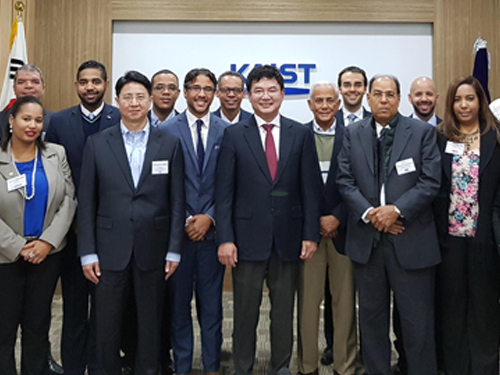 KAIST and KOICA Invited Dominican Republic Officials for Workshop
KAIST will host a two-week workshop for Dominican Republic officials and scholars in collaboration with KOICA (Korea International Cooperation Agency) beginning October 23 at KAIST.
The workshop aims to encourage academia-industry cooperation as one of the Projects for Human Resource Development for Science and Technology at KOICA. Dominican participants including the assistant minister of the Ministry of Higher Education, Science and Technology (MESCYT) and deans of engineering colleges at major universities will enjoy lectures from experts and visit enterprises known for excellent academia-industry collaboration.
According to the Center for Overseas Development, at which Professor WonJoon Kim in the School of Business and Technology Management at KAIST holds the position of director, the workshop is designed to develop human resources in the science and technology (S&T) area, share knowledge on research and development in the field of academia-industry cooperation, and help the participants acquire know-how for managing partnerships between related organizations and industries.
During the workshop, KAIST plans to transfer know-how and share knowledge on its academia-industry cooperation R&D system, in hopes that the workshop will help the Dominican Republic foster its manpower in higher education. The workshop organizers hope that the officers and scholars will be able to apply what they will learn for establishing and carrying out detailed action plans for academia-industry cooperation policies in an effective manner.
“This workshop provides an opportunity to learn about the development of S&T in Korea, academia-industry cooperation R&D, and fostering manpower in advanced S&T. Through the knowledge sharing, we can have a better understanding of academia-industry cooperation as well as education on advanced manpower,” said Pedro Antonio Eduardo, the assistant minister of MESCYT.
He added, “I hope that this workshop will further detailed cooperation between the two countries for Korean high-tech enterprises’ overseas expansion and advanced manpower education. The development model in Korea has many essential elements, so learning its engine for growth and polytechnic manpower education will help develop my country’s industry sector.”
The Project for Human Resource Development for Science and Technology is one of the official development assistance projects running from last year until 2019. It promotes R&D activities for S&T in the Dominican Republic, encouraging academia-industry cooperation by improving trainers in charge of advanced manpower education.
2017.10.30 View 9115
KAIST and KOICA Invited Dominican Republic Officials for Workshop
KAIST will host a two-week workshop for Dominican Republic officials and scholars in collaboration with KOICA (Korea International Cooperation Agency) beginning October 23 at KAIST.
The workshop aims to encourage academia-industry cooperation as one of the Projects for Human Resource Development for Science and Technology at KOICA. Dominican participants including the assistant minister of the Ministry of Higher Education, Science and Technology (MESCYT) and deans of engineering colleges at major universities will enjoy lectures from experts and visit enterprises known for excellent academia-industry collaboration.
According to the Center for Overseas Development, at which Professor WonJoon Kim in the School of Business and Technology Management at KAIST holds the position of director, the workshop is designed to develop human resources in the science and technology (S&T) area, share knowledge on research and development in the field of academia-industry cooperation, and help the participants acquire know-how for managing partnerships between related organizations and industries.
During the workshop, KAIST plans to transfer know-how and share knowledge on its academia-industry cooperation R&D system, in hopes that the workshop will help the Dominican Republic foster its manpower in higher education. The workshop organizers hope that the officers and scholars will be able to apply what they will learn for establishing and carrying out detailed action plans for academia-industry cooperation policies in an effective manner.
“This workshop provides an opportunity to learn about the development of S&T in Korea, academia-industry cooperation R&D, and fostering manpower in advanced S&T. Through the knowledge sharing, we can have a better understanding of academia-industry cooperation as well as education on advanced manpower,” said Pedro Antonio Eduardo, the assistant minister of MESCYT.
He added, “I hope that this workshop will further detailed cooperation between the two countries for Korean high-tech enterprises’ overseas expansion and advanced manpower education. The development model in Korea has many essential elements, so learning its engine for growth and polytechnic manpower education will help develop my country’s industry sector.”
The Project for Human Resource Development for Science and Technology is one of the official development assistance projects running from last year until 2019. It promotes R&D activities for S&T in the Dominican Republic, encouraging academia-industry cooperation by improving trainers in charge of advanced manpower education.
2017.10.30 View 9115 -
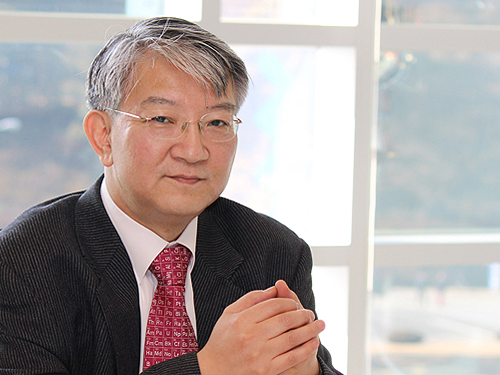 Distinguished Professor Lee Named International Fellow of the CAS
Distinguished Professor Sang Yup Lee from the Department of Chemical and Biomolecular Engineering at KAIST was awarded the title of distinguished professor and international fellow from the Chinese Academy of Sciences (CAS), and honorary professor from its affiliated organization the Tianjin Institute of Industrial Biotechnology (TIB).
The CAS recognized Distinguished Professor Lee for his significant contributions to biotechnology. He has made significant pioneering academic achievements in the area of systems metabolic engineering, which produces useful chemicals from microorganisms. Not only did he develop the first and best source technology in that field, but also came out with processes for the production of biofuel and environmentally-friendly chemicals.”
As a global leader in systems metabolic engineering, Distinguished Professor Lee has also been appointed as an honorary professor at Jiangnan University in Wuxi, China.
Distinguished Professor Lee was listed in the ‘Top 20 Translational Researchers of 2014’ selected by the renowned international journal Nature Biotechnology. Moreover, he was the first Asian recipient of the James E. Bailey Award in 2016 and Marvin J. Johnson Award in 2012, which are given to scholars in the field of biotechnology.
He is also one of 13 global scientists who are foreign members of the renowned academic societies the National Academy of Engineering and the National Academy of Sciences in the US. Furthermore, he received the ‘2017 Korea Best Scientist Award’ from the president of Korea in July. Finally, his founding field, systems metabolic engineering, was chosen as one of the ‘Top 10 Emerging Technologies of 2016’ by the World Economic Forum.
The Chinese Academy of Sciences, established in November 1949, is an academic organization that carries out research on basic sciences and natural sciences in China. It defined its science and technology system to include the fields of basic sciences, natural sciences, and high technology. While having a base in Beijing, its branch academies are located in 12 main cities along with 117 affiliates and 100 national key labs.
2017.10.26 View 13254
Distinguished Professor Lee Named International Fellow of the CAS
Distinguished Professor Sang Yup Lee from the Department of Chemical and Biomolecular Engineering at KAIST was awarded the title of distinguished professor and international fellow from the Chinese Academy of Sciences (CAS), and honorary professor from its affiliated organization the Tianjin Institute of Industrial Biotechnology (TIB).
The CAS recognized Distinguished Professor Lee for his significant contributions to biotechnology. He has made significant pioneering academic achievements in the area of systems metabolic engineering, which produces useful chemicals from microorganisms. Not only did he develop the first and best source technology in that field, but also came out with processes for the production of biofuel and environmentally-friendly chemicals.”
As a global leader in systems metabolic engineering, Distinguished Professor Lee has also been appointed as an honorary professor at Jiangnan University in Wuxi, China.
Distinguished Professor Lee was listed in the ‘Top 20 Translational Researchers of 2014’ selected by the renowned international journal Nature Biotechnology. Moreover, he was the first Asian recipient of the James E. Bailey Award in 2016 and Marvin J. Johnson Award in 2012, which are given to scholars in the field of biotechnology.
He is also one of 13 global scientists who are foreign members of the renowned academic societies the National Academy of Engineering and the National Academy of Sciences in the US. Furthermore, he received the ‘2017 Korea Best Scientist Award’ from the president of Korea in July. Finally, his founding field, systems metabolic engineering, was chosen as one of the ‘Top 10 Emerging Technologies of 2016’ by the World Economic Forum.
The Chinese Academy of Sciences, established in November 1949, is an academic organization that carries out research on basic sciences and natural sciences in China. It defined its science and technology system to include the fields of basic sciences, natural sciences, and high technology. While having a base in Beijing, its branch academies are located in 12 main cities along with 117 affiliates and 100 national key labs.
2017.10.26 View 13254 -
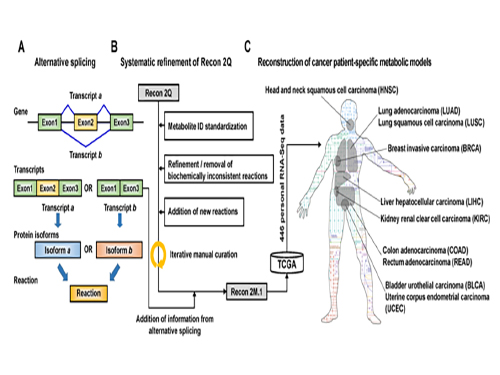 Development of a Highly-Accurate Computational Model of Human Metabolism
A research team from KAIST developed a computational framework that enables the reconstruction of a comprehensive computational model of human metabolism, which allows for an accurate prediction of personal metabolic features (or phenotypes).
Understanding personal metabolic phenotypes allows us to design effective therapeutic strategies for various chronic and infectious diseases. A human computational model called the genome-scale metabolic model (GEM) contains information on thousands of metabolic genes and their corresponding reactions and metabolites, and has played an important role in predicting metabolic phenotypes. Although several versions of human GEMs have been released, they had room for further development, especially as to incorporating biological information coming from a human genetics mechanism called “alternative splicing.” Alternative splicing is a genetic mechanism that allows a gene to give rise to multiple reactions, and is strongly associated with pathology.
To tackle this problem, Jae Yong Ryu (a Ph.D. student), Dr. Hyun Uk Kim (Research Fellow), and Distinguished Professor Sang Yup Lee, all from the Department of Chemical and Biomolecular Engineering at KAIST, developed a computational framework that systematically generates metabolic reactions, and adds them to the human GEM. The resulting human GEM was demonstrated to accurately predict metabolic phenotypes under varied environmental conditions. The research results were published online in Proceedings of the National Academy of Sciences (PNAS) on October 24, 2017, under the title “Framework and resource for more than 11,000 gene-transcript-protein-reaction associations in human metabolism.”
The research team first updated the biological contents of a previous version of the human GEM. The updated biological contents include metabolic genes and their corresponding metabolites and reactions. In particular, metabolic reactions catalyzed by already-known protein isoforms were additionally incorporated into the human GEM; protein isoforms are multiple variants of proteins generated from individual genes through the alternative splicing process. Each protein isoform is often responsible for the operation of a metabolic reaction. Although multiple protein isoforms generated from one gene can play different functions by having different sets of protein domains and/or subcellular localizations, such information was not properly considered in previous versions of human GEMs.
Upon the initial update of the human GEM, named Recon 2M.1, the research team subsequently implemented a computational framework that systematically generates information on Gene-Transcript-Protein-Reaction Associations (GeTPRA) in order to identify protein isoforms that were previously not identified. This framework was developed in this study. As a result of the implementation of the framework for GeTPRA, more than 11,000 GeTPRA were automatically predicted, and thoroughly validated. Additional metabolic reactions were then added to Recon 2M.1 based on the predicted GeTPRA for the previously uncharacterized protein isoforms; Recon 2M.1 was renamed Recon 2M.2 from this upgrade.
Finally, Recon 2M.2 was integrated with 446 sets of personal biological data (RNA-Seq data) in order to build patient-specific cancer models. These patient-specific cancer models were used to predict cancer metabolism activities and anticancer targets.
The development of a new version of human GEMs along with the computational framework for GeTPRA is expected to boost studies in fundamental human genetics and medicine. Model files of the human GEMs Recon 2M.1 and 2M.2, a full list of the GeTPRA and the source code for the computational framework to predict the GeTPRA are all available as part of the publication of this study.
Distinguished Professor Lee said, “The predicted GeTPRA from the computational framework is expected to serve as a guideline for future experiments on human genetics and biochemistry, whereas the resulting Recon 2M.2 can be used to predict drug targets for various human diseases.”
This work was supported by the Technology Development Program to Solve Climate Changes on Systems Metabolic Engineering for Biorefineries (NRF-2012M1A2A2026556 and NRF-2012M1A2A2026557) from the Ministry of Science and ICT through the National Research Foundation (NRF) of Korea.
(Figure 1:A scheme of Recon 2M.1 development and its use in reconstructing personal genome-scale metabolic models (GEMs). (A) A concept of alternative splicing of human genes and its use in Gene-Transcript-Protein-Reaction Associations (GeTPRA) of Recon 2M.1. (B) A procedure of systematic refinement of the Recon 2Q. Recon 2Q is one of the previously released human GEMs. Biochemically inconsistent reactions include unbalanced, artificial, blocked, and/or redundant reactions. Iterative manual curation was conducted while validating the Recon 2M.1. (C) Reconstruction of cancer patient-specific GEMs using Recon 2M.1 for further simulation studies. In this study, personal biological data (RNA-Seq data) were obtained from The Cancer Genome Atlas (TCGA; https://cancergenome.nih.gov/ ) across the ten cancer types.
(Figure 2: Computational framework for the systematic generation of Gene-Transcript-Protein-Reaction Associations (GeTPRA; red box in the flowchart). Peptide sequences of metabolic genes defined in Recon 2M.1 were retrieved from a database called Ensembl. EC numbers and subcellular localizations of all the protein isoforms of metabolic genes in Recon 2M.1 were predicted using software programs EFICAz2.5 and Wolf PSort, respectively. Information on the newly predicted GeTPRA was systematically incorporated into the Recon 2M.1, thereby resulting in Recon 2M.2.)
2017.10.25 View 10907
Development of a Highly-Accurate Computational Model of Human Metabolism
A research team from KAIST developed a computational framework that enables the reconstruction of a comprehensive computational model of human metabolism, which allows for an accurate prediction of personal metabolic features (or phenotypes).
Understanding personal metabolic phenotypes allows us to design effective therapeutic strategies for various chronic and infectious diseases. A human computational model called the genome-scale metabolic model (GEM) contains information on thousands of metabolic genes and their corresponding reactions and metabolites, and has played an important role in predicting metabolic phenotypes. Although several versions of human GEMs have been released, they had room for further development, especially as to incorporating biological information coming from a human genetics mechanism called “alternative splicing.” Alternative splicing is a genetic mechanism that allows a gene to give rise to multiple reactions, and is strongly associated with pathology.
To tackle this problem, Jae Yong Ryu (a Ph.D. student), Dr. Hyun Uk Kim (Research Fellow), and Distinguished Professor Sang Yup Lee, all from the Department of Chemical and Biomolecular Engineering at KAIST, developed a computational framework that systematically generates metabolic reactions, and adds them to the human GEM. The resulting human GEM was demonstrated to accurately predict metabolic phenotypes under varied environmental conditions. The research results were published online in Proceedings of the National Academy of Sciences (PNAS) on October 24, 2017, under the title “Framework and resource for more than 11,000 gene-transcript-protein-reaction associations in human metabolism.”
The research team first updated the biological contents of a previous version of the human GEM. The updated biological contents include metabolic genes and their corresponding metabolites and reactions. In particular, metabolic reactions catalyzed by already-known protein isoforms were additionally incorporated into the human GEM; protein isoforms are multiple variants of proteins generated from individual genes through the alternative splicing process. Each protein isoform is often responsible for the operation of a metabolic reaction. Although multiple protein isoforms generated from one gene can play different functions by having different sets of protein domains and/or subcellular localizations, such information was not properly considered in previous versions of human GEMs.
Upon the initial update of the human GEM, named Recon 2M.1, the research team subsequently implemented a computational framework that systematically generates information on Gene-Transcript-Protein-Reaction Associations (GeTPRA) in order to identify protein isoforms that were previously not identified. This framework was developed in this study. As a result of the implementation of the framework for GeTPRA, more than 11,000 GeTPRA were automatically predicted, and thoroughly validated. Additional metabolic reactions were then added to Recon 2M.1 based on the predicted GeTPRA for the previously uncharacterized protein isoforms; Recon 2M.1 was renamed Recon 2M.2 from this upgrade.
Finally, Recon 2M.2 was integrated with 446 sets of personal biological data (RNA-Seq data) in order to build patient-specific cancer models. These patient-specific cancer models were used to predict cancer metabolism activities and anticancer targets.
The development of a new version of human GEMs along with the computational framework for GeTPRA is expected to boost studies in fundamental human genetics and medicine. Model files of the human GEMs Recon 2M.1 and 2M.2, a full list of the GeTPRA and the source code for the computational framework to predict the GeTPRA are all available as part of the publication of this study.
Distinguished Professor Lee said, “The predicted GeTPRA from the computational framework is expected to serve as a guideline for future experiments on human genetics and biochemistry, whereas the resulting Recon 2M.2 can be used to predict drug targets for various human diseases.”
This work was supported by the Technology Development Program to Solve Climate Changes on Systems Metabolic Engineering for Biorefineries (NRF-2012M1A2A2026556 and NRF-2012M1A2A2026557) from the Ministry of Science and ICT through the National Research Foundation (NRF) of Korea.
(Figure 1:A scheme of Recon 2M.1 development and its use in reconstructing personal genome-scale metabolic models (GEMs). (A) A concept of alternative splicing of human genes and its use in Gene-Transcript-Protein-Reaction Associations (GeTPRA) of Recon 2M.1. (B) A procedure of systematic refinement of the Recon 2Q. Recon 2Q is one of the previously released human GEMs. Biochemically inconsistent reactions include unbalanced, artificial, blocked, and/or redundant reactions. Iterative manual curation was conducted while validating the Recon 2M.1. (C) Reconstruction of cancer patient-specific GEMs using Recon 2M.1 for further simulation studies. In this study, personal biological data (RNA-Seq data) were obtained from The Cancer Genome Atlas (TCGA; https://cancergenome.nih.gov/ ) across the ten cancer types.
(Figure 2: Computational framework for the systematic generation of Gene-Transcript-Protein-Reaction Associations (GeTPRA; red box in the flowchart). Peptide sequences of metabolic genes defined in Recon 2M.1 were retrieved from a database called Ensembl. EC numbers and subcellular localizations of all the protein isoforms of metabolic genes in Recon 2M.1 were predicted using software programs EFICAz2.5 and Wolf PSort, respectively. Information on the newly predicted GeTPRA was systematically incorporated into the Recon 2M.1, thereby resulting in Recon 2M.2.)
2017.10.25 View 10907 -
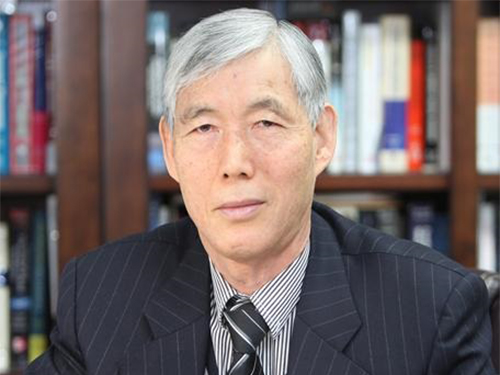 Professor Dai Gil Lee Recognized by the ICCS
Emeritus Professor Dai Gil Lee, from the School of Mechanical and Aerospace Engineering at KAIST, received a special achievement award from the 20th International Conference on Composite Structures (ICCS).
ICCS is a renowned conference in the field of applied composite structures, which highlights the practicality of composite structures. This year, the conference was held at the Conservatoire National des Arts et Métiers (CNAM), Paris, France from September 4 to 7. Approximately 650 papers were presented from 45 countries.
Especially, the conference honored Emeritus Professor Lee, who has been engaged in ICCS since 1993 and received best paper award twice. The ICCS recognized him for serving with distinction in science and technology in the fields of composite materials and structures. As a member of the Editorial Board for many years, he gave significant support to the journal Composite Structures. At the conference, he gave a special lecture titled ‘Lightweight Carbon Composite Proton Exchange Membrane Fuel Cells’.
Professor Lee said, “I will dedicate myself to innovate Vanadium Redox Flow Battery-ESS (VRFB) based on the research findings announced at the conference and related patents. I am hoping that these efforts will contribute to solving energy issues around the world.”
2017.10.19 View 9271
Professor Dai Gil Lee Recognized by the ICCS
Emeritus Professor Dai Gil Lee, from the School of Mechanical and Aerospace Engineering at KAIST, received a special achievement award from the 20th International Conference on Composite Structures (ICCS).
ICCS is a renowned conference in the field of applied composite structures, which highlights the practicality of composite structures. This year, the conference was held at the Conservatoire National des Arts et Métiers (CNAM), Paris, France from September 4 to 7. Approximately 650 papers were presented from 45 countries.
Especially, the conference honored Emeritus Professor Lee, who has been engaged in ICCS since 1993 and received best paper award twice. The ICCS recognized him for serving with distinction in science and technology in the fields of composite materials and structures. As a member of the Editorial Board for many years, he gave significant support to the journal Composite Structures. At the conference, he gave a special lecture titled ‘Lightweight Carbon Composite Proton Exchange Membrane Fuel Cells’.
Professor Lee said, “I will dedicate myself to innovate Vanadium Redox Flow Battery-ESS (VRFB) based on the research findings announced at the conference and related patents. I am hoping that these efforts will contribute to solving energy issues around the world.”
2017.10.19 View 9271 -
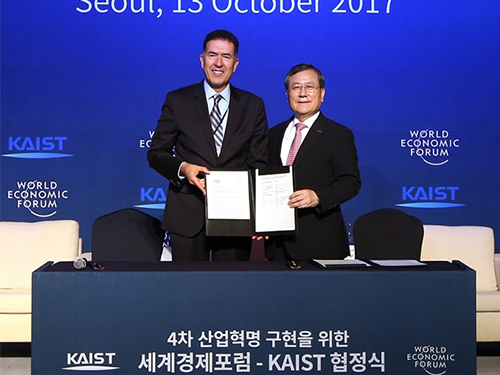 KAIST Partners with WEF to Prepare for the 4th Industrial Revolution
KAIST President Sung-Chul Shin and the Head of the World Economic Forum Center for the Fourth Industrial Revolution, Murat Sonmez, made a commitment to build cooperation in an active manner for addressing the ramifications of the Fourth Industrial Revolution.
The two signed an MOU to cooperate in research in related fields on October 13 after holding a roundtable discussion titled “The Future of Jobs and Inclusive Growth in Korea”. It is the first partnership that the WEF has sealed with an academic institution.The roundtable discussion brought together distinguished guests from politics, non-profit civic organizations, academia, and enterprises including Daejeon Mayor Seon-Taek Kwon, Doosan Group Vice Chairman Lee Hyun-Soon, and Korean Venture Business Association President Ahn Keon-Joon.
During the news conference, President Shin said, “This event means a lot because it explores ways in which inclusive growth and job creation can be realized in Korea. To move forward in the new age of the Fourth Industrial Revolution, every country needs to adopt appropriate new policies suitable for their specific market environments. KAIST will contribute to this process for Korea as well as for the global community.”
President Shin also said, “Korea has been a fast follower in previous industrial revolutions. Now, we have the momentum to seize the opportunities in the wake of this revolution. KAIST is dedicated to leading Korea into becoming a first mover in the Fourth Industrial Revolution by cooperating with the WEF.”
“Two decades later, we will live with considerable number of robots around us. It is possible that our societies in the future will consist of Homo sapiens and Robo sapiens. We need to create new jobs for Homo sapiens to prepare for a society that we will have to coexist with a new industrial tribe. Industries need continuing education to retrain workers for the ever evolving industrial landscape of the future,” President Shin emphasized.
Meanwhile, Sonmez pointed out that all stakeholders should participate in understanding the new industrial environment’s ramifications, saying “Societies, governments, public and private sectors, startups, and academia should co-design inclusive models through global efforts. Ethics and influences on the job market should also be taken into consideration.”
Sonmez said nine factors such as blockchains, internet of things, artificial intelligence, machine learning, cross-border data blow, drones, 3D printing, autonomous driving, the environment, and precision medicine will take center stage in the Fourth Industrial Revolution, In particular, he said that blockchains, which are a cybersecurity technology for online financial transactions, will bring even bigger changes than the ‘World Wide Web’ has done over the past three decades.
“To this end, we will have to work closely with major academic institutes. Through this partnership with KAIST, we will make the fruits of the new industrial environment benefit Koreans and Korean society,” Sonmez added.
2017.10.14 View 9895
KAIST Partners with WEF to Prepare for the 4th Industrial Revolution
KAIST President Sung-Chul Shin and the Head of the World Economic Forum Center for the Fourth Industrial Revolution, Murat Sonmez, made a commitment to build cooperation in an active manner for addressing the ramifications of the Fourth Industrial Revolution.
The two signed an MOU to cooperate in research in related fields on October 13 after holding a roundtable discussion titled “The Future of Jobs and Inclusive Growth in Korea”. It is the first partnership that the WEF has sealed with an academic institution.The roundtable discussion brought together distinguished guests from politics, non-profit civic organizations, academia, and enterprises including Daejeon Mayor Seon-Taek Kwon, Doosan Group Vice Chairman Lee Hyun-Soon, and Korean Venture Business Association President Ahn Keon-Joon.
During the news conference, President Shin said, “This event means a lot because it explores ways in which inclusive growth and job creation can be realized in Korea. To move forward in the new age of the Fourth Industrial Revolution, every country needs to adopt appropriate new policies suitable for their specific market environments. KAIST will contribute to this process for Korea as well as for the global community.”
President Shin also said, “Korea has been a fast follower in previous industrial revolutions. Now, we have the momentum to seize the opportunities in the wake of this revolution. KAIST is dedicated to leading Korea into becoming a first mover in the Fourth Industrial Revolution by cooperating with the WEF.”
“Two decades later, we will live with considerable number of robots around us. It is possible that our societies in the future will consist of Homo sapiens and Robo sapiens. We need to create new jobs for Homo sapiens to prepare for a society that we will have to coexist with a new industrial tribe. Industries need continuing education to retrain workers for the ever evolving industrial landscape of the future,” President Shin emphasized.
Meanwhile, Sonmez pointed out that all stakeholders should participate in understanding the new industrial environment’s ramifications, saying “Societies, governments, public and private sectors, startups, and academia should co-design inclusive models through global efforts. Ethics and influences on the job market should also be taken into consideration.”
Sonmez said nine factors such as blockchains, internet of things, artificial intelligence, machine learning, cross-border data blow, drones, 3D printing, autonomous driving, the environment, and precision medicine will take center stage in the Fourth Industrial Revolution, In particular, he said that blockchains, which are a cybersecurity technology for online financial transactions, will bring even bigger changes than the ‘World Wide Web’ has done over the past three decades.
“To this end, we will have to work closely with major academic institutes. Through this partnership with KAIST, we will make the fruits of the new industrial environment benefit Koreans and Korean society,” Sonmez added.
2017.10.14 View 9895 -
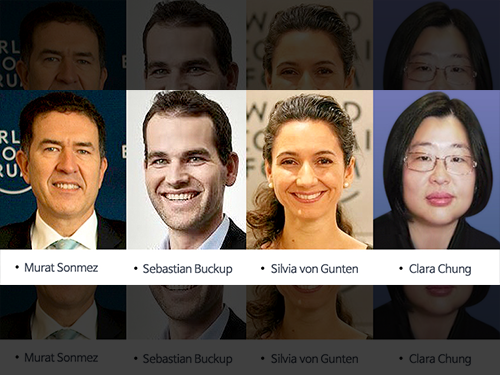 KAIST-WEF Roundtable on Inclusive Growth and Job Creation
The World Economic Forum (WEF) will join KAIST in an effort to address sweeping global problems in the wake of the Fourth Industrial Revolution. The two will co-host a roundtable on ‘Shaping Korea’s Priorities for Inclusive Growth and Job Creation in the Fourth Industrial Revolution’ on October 13 at Lotte Hotel in Seoul.
The roundtable will bring together leaders from government, industry, universities, and non-profit civic organizations to have an in-depth discussion on a thought-provoking agenda of inclusive growth and job creation which scientific and technological changes will bring about. The event will provide a platform to explore practical collaboration and innovative strategies for better job creation and innovation ecosystems.
The two will also sign an MOU for collaboration between the Fourth Industrial Revolution Information Center (FIRIC) of KAIST and the WEF Center for the Fourth Industrial Revolution (C4IR).
President Sung-Chul Shin of KAIST and the Head of the WEF Center for the Fourth Industrial Revolution, Murat Sonmez, will lead the panel discussion titled ‘Inclusive Growth and the Fourth Industrial Revolution’ which will be attended by leaders from government, industry, and non-profit civic organizations.
At the breakout sessions, the topics will be “Future Jobs” and the “Creation of Innovation Ecosystems”. Additionally, a discussion on the “SME 4.0 Initiative”, which is a program pushed forward by KAIST in collaboration with local governments, will talk about job creation through innovation in small and medium-sized enterprises (SMEs). The WEF will introduce their two-year activities and research on the Fourth Industrial Revolution, which have great potential and a high possibility of successfully undergoing the revolution, to Korea.
Since WEF Executive Chairman Klaus Schwab brought up the topic of the Fourth Industrial Revolution, the WEF has been leading agenda topics and discussions on high-profile matters, including ‘technology-driven but human-centered inclusive growth’ in predicting the future of jobs.
The WEF is a nonprofit organization committed to addressing the world’s weightiest problems. It is best known for its annual meetings in Davos, Switzerland, which attracts leaders from around the world. KAIST has been participating in this summit since 2009. President Shin will also attend the upcoming Davos summit next January. Distinguished Professor Sang Yup Lee who heads the KAIST Institute and the FIRIC is the co-chair of the Global Council on Biotechnology and a member of the Global Future Council on the Fourth Industrial Revolution at the WEF.
Moreover, President Shin and Mr. Sonmez will explain the background of the roundtable and share the results of the sessions at a joint news conference.
2017.09.28 View 11257
KAIST-WEF Roundtable on Inclusive Growth and Job Creation
The World Economic Forum (WEF) will join KAIST in an effort to address sweeping global problems in the wake of the Fourth Industrial Revolution. The two will co-host a roundtable on ‘Shaping Korea’s Priorities for Inclusive Growth and Job Creation in the Fourth Industrial Revolution’ on October 13 at Lotte Hotel in Seoul.
The roundtable will bring together leaders from government, industry, universities, and non-profit civic organizations to have an in-depth discussion on a thought-provoking agenda of inclusive growth and job creation which scientific and technological changes will bring about. The event will provide a platform to explore practical collaboration and innovative strategies for better job creation and innovation ecosystems.
The two will also sign an MOU for collaboration between the Fourth Industrial Revolution Information Center (FIRIC) of KAIST and the WEF Center for the Fourth Industrial Revolution (C4IR).
President Sung-Chul Shin of KAIST and the Head of the WEF Center for the Fourth Industrial Revolution, Murat Sonmez, will lead the panel discussion titled ‘Inclusive Growth and the Fourth Industrial Revolution’ which will be attended by leaders from government, industry, and non-profit civic organizations.
At the breakout sessions, the topics will be “Future Jobs” and the “Creation of Innovation Ecosystems”. Additionally, a discussion on the “SME 4.0 Initiative”, which is a program pushed forward by KAIST in collaboration with local governments, will talk about job creation through innovation in small and medium-sized enterprises (SMEs). The WEF will introduce their two-year activities and research on the Fourth Industrial Revolution, which have great potential and a high possibility of successfully undergoing the revolution, to Korea.
Since WEF Executive Chairman Klaus Schwab brought up the topic of the Fourth Industrial Revolution, the WEF has been leading agenda topics and discussions on high-profile matters, including ‘technology-driven but human-centered inclusive growth’ in predicting the future of jobs.
The WEF is a nonprofit organization committed to addressing the world’s weightiest problems. It is best known for its annual meetings in Davos, Switzerland, which attracts leaders from around the world. KAIST has been participating in this summit since 2009. President Shin will also attend the upcoming Davos summit next January. Distinguished Professor Sang Yup Lee who heads the KAIST Institute and the FIRIC is the co-chair of the Global Council on Biotechnology and a member of the Global Future Council on the Fourth Industrial Revolution at the WEF.
Moreover, President Shin and Mr. Sonmez will explain the background of the roundtable and share the results of the sessions at a joint news conference.
2017.09.28 View 11257